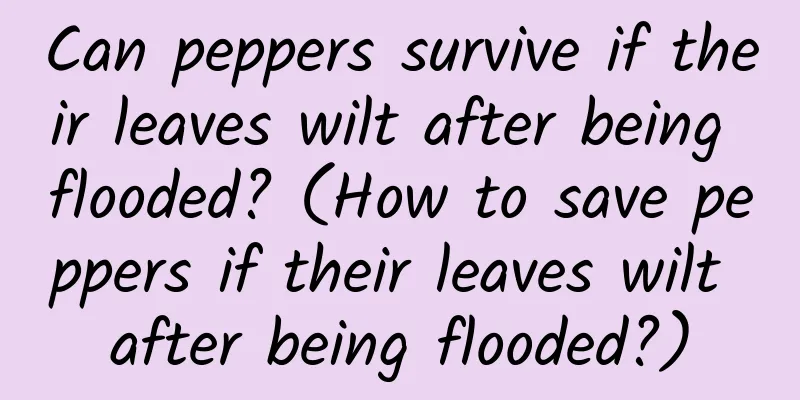Can peppers survive if their leaves wilt after being flooded? (How to save peppers if their leaves wilt after being flooded?)

Is there any way to save the pepper leaves that have fallen off after being flooded?As the rainy season approaches, rainfall increases, especially in the south, where many places have suffered floods. The water flooded the homes where people had lived for generations, causing great harm to people's production and life. Even the vegetables planted in front of their homes were submerged and no one was spared. Peppers are crops that are neither tolerant to waterlogging nor drought. They have strict requirements for water and are most afraid of waterlogging. So, if peppers are flooded and their leaves turn yellow and fall off, can they still survive? How can we remedy this problem? In fact, the most effective way is to wait until it stops raining and then find a way to drain the water from the pepper field . As long as there is no water accumulation in the ground and the roots of the peppers are not immersed in water, the breathing of their roots will become unimpeded, reducing the damage caused to the peppers after being flooded. Secondly, we can promptly remove old leaves, yellow leaves, diseased leaves and the lower leaves soaked in stagnant water to avoid them becoming a source of infection for the disease. When the weather becomes clear, you can hoe the soil appropriately to increase the permeability of the soil. For some pepper seedlings with weak growth, you can selectively spray foliar fertilizer to promote plant growth and achieve the purpose of protecting and promoting seedlings. In fact, in order to prevent such a situation from happening to pepper plants, we can take preventive measures in advance in the following aspects: First, choose pepper varieties with good flood resistance and stress resistance. Second, peppers are afraid of waterlogging, so we can choose to cultivate them on high ridges. Even if there is water accumulation after rain, the chance of being flooded is reduced, thus reducing damage to the peppers. Third , during the rainy season, we must dig drainage ditches in advance so that even if it rains, the rainwater will flow out through the drainage ditches. In short, peppers are crops that like water but are afraid of water. If they are flooded, the first thing we must do is to drain the water, loosen the soil with a hoe, increase soil permeability, supplement nutrients appropriately, promote the growth of peppers, and try to save the flooded peppers! We can also take precautions in advance to "prevent problems before they happen" and reduce the possibility of peppers being soaked in stagnant water, thus avoiding losses caused by reduced or even total production! |
Recommend
How to propagate Prunella vulgaris
seed Collecting seeds: Starting from June every y...
Do you need to apply foliar fertilizer to flowers in winter?
1. Can you give In fact, we can apply foliar fert...
Leaf cutting propagation of alum root
Materials for leaf cutting propagation soil Alumr...
Why is the Monstera leaning from side to side?
1. Not Deeply Rooted Reason: If Monstera grows cr...
Where is the most suitable place for wormwood to grow?
Where does wormwood grow? Mugwort is suitable for...
Are lilies poisonous when placed indoors?
1. No toxicity Lilies are not poisonous. However,...
When does the purple leaf plum bear fruit?
Fruiting period The fruit of the purple-leaf plum...
How to prune gardenia after it withers
1. Cut off the remaining flowers After the flower...
Photinia prefers shade or sun?
Photinia prefers shade or sun? Photinia fraseri i...
How many times should roses be watered in summer?
1. How many days should I water? 1. Outdoors: The...
When is the best time to harvest black sesame? What month is the black sesame harvest season?
Black sesame planting is divided into summer sesa...
Can I cut a piece of asparagus fern and grow it in water?
1. Can it be raised in water? Asparagus fern can ...
What is the difference between sulphureus and caltrops?
1. Leaf Difference The leaves of the sulphur aste...
Can I water the plum tree when it is blooming?
Watering the flowering plum tree The plum tree ca...
How does the lucky tree grow new roots in winter and how to water it in winter
1. New rooting method 1. If the roots of the cult...









